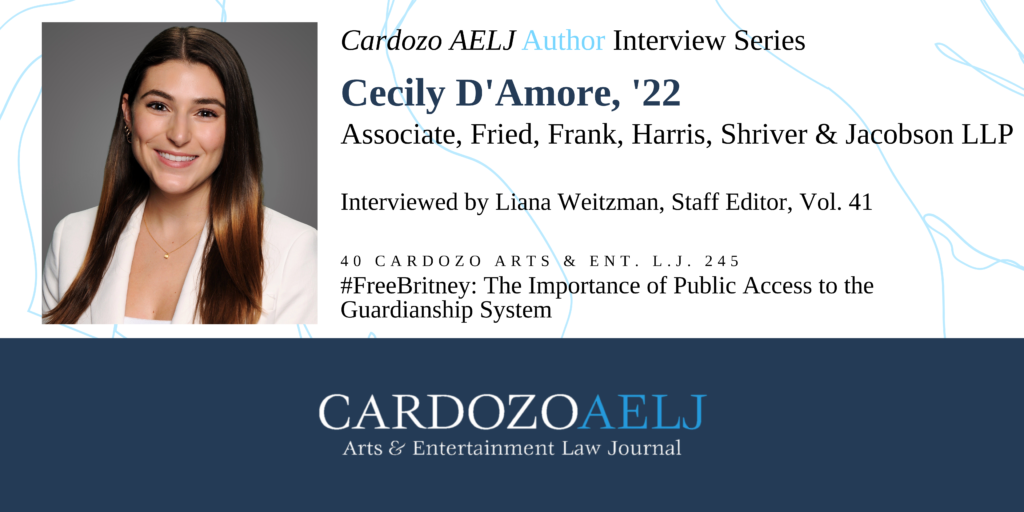
The Cardozo AELJ Author Interview Series seeks to give our readers further insight into the Articles and Notes published in the Cardozo Arts & Entertainment Law Journal. In this interview, Cecily D’Amore discusses her Note, #FreeBritney: The Importance of Public Access to the Guardianship System, which was published in Volume 40, Issue 1.
Cecily D’Amore is an Associate in the M&A and Private Equity Group at Fried, Frank, Harris, Shriver & Jacobson. Cecily graduated magna cum laude and with the JD Intellectual Property Award in the Benjamin N. Cardozo School of Law Class of 2022. In her time on Cardozo AELJ, she served as a Staff Editor on Vol. 39 and Symposium Editor on Vol. 40. As Symposium Editor, Cecily organized both of Cardozo AELJ’s Spring 2022 Symposiums: “The Parthenon Marbles Case and the Universal Museum Myth: Policies and Politics” and “25 Years of Section 230: Retain, Reform, or Repeal?”
Our interview with Cecily was conducted by Liana Weitzman. Liana is a Second Year Law Student at the Benjamin N. Cardozo School of Law and an Acquisitions Editor on Vol. 42 of the Cardozo Arts & Entertainment Law Journal. Liana is interested in health law, entertainment law, and family law.
LW: How did you come up with this note topic? Did you think of this topic because of the current publicity surrounding Britney Spears, or did you first know about guardianship law and want to research it?
CD: I came up with this topic when I was brainstorming ideas with my Articles Editor early in my 2L year. We were both bouncing topics off each other, and she actually had mentioned Britney Spears’ conservatorship. I didn’t know much about it at all at the time. The #FreeBritney movement was established by then, but it hadn’t blown up on social media or started to really unravel yet, and much of the controversy surrounding it was speculation because Britney hadn’t addressed it herself. I did a deeper dive into the topic on social media after we had talked about it, and I found myself getting deeper and deeper into the rabbit hole, finding it simultaneously so interesting and so concerning. There were so many questions left unanswered, and the conservatorship had a really complicated history. My research, of course, brought me into the world of guardianship law, which I did not know much about either, and a lot of the policy issues really struck me as significant. I thought that getting at those issues through the lens of Britney’s case would be really powerful and I knew there would be so many different directions in which I could take the Note. I talked to my faculty advisor, who has significant expertise in guardianship law, about how it would be best to tie the topics together and about what niche to focus on, and that all led me here.
LW: Why do you believe that Jamie Spears agreed to step down as conservator of the estate? Do you believe it was for publicity / to appease the public or because he thought it would be the best decision for his daughter?
CD: I do think Jamie finally stepped down because of the public attention the conservatorship had gotten. I think that put a lot of pressure on him, particularly once Britney started to speak out about the harm the conservatorship was causing her and once she was able to get her own representation. It really put him in a tough position because it made it much harder for him to show that it would be in her best interest to serve as conservator when Britney was outrightly and specifically expressing her interest in having him removed, seemingly very much with the capacity to advocate for herself. Once things started to unravel and more was coming out about the questionable (at the very least) history of the conservatorship, my guess is that Jamie recognized that it was in his own best interest to get out and cut his losses, despite the serious and long-term damage that was already caused. I do not think it was out of concern for Britney’s best interest. I think it was an attempt to salvage his image and was out of concern for his own best interest.
LW: Have there been any interesting developments since your Note was submitted for publication?
CD: There have been so many interesting developments since initially submitting my Note for publication. I was actually still making some final edits through this past June because there was so much that came out, including through documentaries, Britney’s Instagram, in court, as a matter of policy, and more. There are now multiple documentaries regarding the conservatorship, featuring even those very close to Britney over the years. Although Britney was not featured herself in them, she has been very vocal about the conservatorship on social media. She has been known to post multiple pictures of written text on her Instagram about some of the harm she experienced under her conservatorship and how it has impacted her relationships with her family members and her life more broadly.
At the policy level, California Governor Newsom recently signed a bill into law attempting to limit conservatorships by giving persons under conservatorship preference for selecting a conservator and making it easier to end conservatorships. I think this was a huge win that came in response to the spotlight brought on guardianship policy in light of Britney’s case. As I talk about more in my Note, I think advocacy groups were able to capitalize on the media exposure and made a huge legislative push for change. This is why I think her case was such a powerful hook on this important issue – it brought so much attention to a topic that, as I say in my Note, has been largely swept away in the metaphorical attic of the legal field.
In court, the controversy has continued since the end of the conservatorship and has been somewhat messy. There’s been a lot of back and forth over who should pay legal fees and how to address conservatorship mismanagement. At the beginning of 2022, Jamie also tried to get various records, including Britney’s medical records, unsealed. Judge Penny denied this request. There are several hearings scheduled in December 2022 and January 2023 to address outstanding issues.
LW: How do you think Britney Spears’ case would differ if brought in a different state/jurisdiction, such as New York? If the facts were the same and the same motions were filed, do you believe would there be a different outcome?
CD: I think it is really hard to say how things would have gone if they weren’t in California, and I actually think it is really hard to say how things would have gone even if it was just in a different court in California, or even just presented to a different judge in the same court. In my opinion, despite the obvious ground rules set by the relevant laws, a lot of decisions lie in the judge’s discretion, and I think that discretion is pretty broad. I definitely think there could have been a different outcome on many points, even if all the same facts were presented and the same motions were filed. With respect to the case being brought in a different state, I think the point stands. This was one of the major topics in my Note, which I wish I could have explored more, but I unfortunately could not dive deeply into all 50 states. Each jurisdiction varies in how it handles guardianship cases. As a matter of policy and law, there is no nationwide consistency, so things could have gone completely differently in another jurisdiction.
LW: The New Yorker article you mentioned in your Note exposed Parks and Shafer,1 two private guardians who abused their power and their clients. The article stated that Parks and Shafer were highly trusted and respected by the court system. How did they gain this reputation?
CD: This hits on another one of the key points I make in my Note, which is that repeat players in the guardianship system have been able to exploit it. In the New Yorker article, the Clark County guardianship commissioner, who had presided over nearly all guardianship cases in that county since 2005, awarded Parks a guardianship nearly once a week. He described Parks and a couple of other professional guardians who frequently appeared in his courtroom as “wonderful, good-hearted, social-worker types.” Shafer was considered “the godfather of guardians in Nevada” and had a career over thirty-five years long. People like Parks and Shafer were incredibly well-connected within the system and had gained the trust of those in power, such that their word went unquestioned time and time again. In one example, a partner of someone for whom Shafer was guardian told the aforementioned guardianship commissioner that Shafer was abusive, to which the commissioner responded, “[h]e’s as good as we got, and I trust him completely.” The article also noted that many people under guardianship and their family members brought complaints to the Las Vegas police department, who consistently refused to take a report and repeatedly stated that it was not a police matter. I could have written 50 pages on this situation alone because there are so many shocking aspects of the Clark County story, but what it all comes back to, and what really is the crux of my Note, is that the insulated nature of the system facilitated situations like this persisting and recurring. The system’s limited resources can create an environment that highly values and relies upon these repeat players, to the point where any oversight is virtually nonexistent. And any external resources do not have the insight or even basic understanding of the system to be able to get involved. This often leaves persons under guardianship helpless from all angles.
LW: Do you think unsealing records is enough to solve the issue? Do you think more court funding would solve the issue? For example, in the Los Angeles Times article you mentioned,2 the author noted that these situations persisted because the court system was understaffed. If the court system was not understaffed, do you believe the problem would have still persisted? If so, is that because you believe it would only diminish the problem and not fully solve it?
CD: I don’t think that unsealing records alone is enough to adequately reform the guardianship system as it stands in the U.S., but I think pivoting to focusing on public access to the system would lay the necessary foundation for other reform efforts to see more success. It’s not that I think increased court oversight, promoting alternatives to guardianship, or additional court funding wouldn’t adequately solve the issue. I think reform in those ways would be incredibly meaningful, but I don’t think it is actually happening in practice. There is certainly a push for all of it, especially by advocacy groups in this space, but my point in highlighting public access to the system is that it is incredibly hard to get additional court funding for adequate staffing and proper oversight when so little is publicly known about how the guardianship system operates. I highlight two specific means of public access, namely maintaining public (1) case information and (2) data, because I think that meaningful reform has not been able to take off without either. Both would undergird those other reform efforts. As seen in Britney’s case, it is easy to speculate that there are issues, but speculation can’t often get us very far. It is shining a light on what actually is going on that lays the groundwork for change, and although that light was shone brightly in Britney’s case, more needs to be done by way of public access for that light to be shone on the rest of the guardianship system.
LW: If some of the most commonly occurring categories of sensitive information to be found in court documents were location, health, and assets, wouldn’t that prove Jamie Spears’ point to keep the documents sealed, as Britney is a very famous celebrity with more to lose if that information would be out in the open?
CD: First, I think it is important to note that the study found that there were relatively few instances of sensitive information in the documents examined as a general matter. And even though it is important to note that the study didn’t examine guardianship documents, I think one of the key principles drawn from the study is that we need to be cautious of over-generalizing when it comes to a concern for one’s privacy being revealed in public court documents. A point that I think could have used more attention in the Note, too, is that this is not a black and white question. It is not a matter of keeping things fully sealed or revealing every piece of information about one’s case and one’s life. There are means of redacting certain information from documents, and there are means of choosing to keep certain parts of a case sealed while leaving other parts unsealed. It is entirely understandable why someone, celebrity or not, would not want information about their location, health, and assets publicly available. However, I still think it is key to have a presumption of openness, as some states, like New York, do already have, in the interest of public access to the guardianship system. In my view, this offers more protection to persons under guardianship by having the case information publicly available for review than keeping everything sealed, where the regular players in the guardianship system, as discussed above, are freer to make decisions to those persons’ detriment.
LW: Do you think that creating a bank of conservators and guardians, or including a mental health screening, would also either solve or improve upon the issue?
CD: I don’t think that these are bad ideas, but I think they raise concerns like any other reform effort. My immediate thought on the bank of guardians takes me back to the repeat players in the system like Parks and Shafer, who effectively lacked any oversight. I would be worried about the dangers of relying on the bank too heavily, and that having one may only insulate the system further. On the other hand, however, I can see how having a group of reliable guardians could be a huge asset to the system, if screened correctly and managed properly. I think mental health screenings also can be a tricky issue, especially when it comes down to who is doing the screening. Britney has been vocal about her many negative experiences with mandated mental health professionals over the course of her conservatorship. What also comes to mind is how easily guardians have historically been able to get fraudulent doctors’ notes for all kinds of things, particularly as shown in the mass exposes, and that could be a concern here as well.
I think this question is a good one, though, to make a broader point and possibly to bring things together nicely. There are so many suggestions for reform in the guardianship system, which makes sense because there is so much room for improvement. Especially as highlighted through the many examples in my Note, it has become very clear that the guardianship practice in this country has failed persons under guardianship time and time again. What is even more concerning, in my view, is what we still don’t know. So, to make space for these many suggestions for reform, such as increased court oversight and funding, maintaining a reliable bank of guardians, improving the quantity and quality of mental health screenings, and much more, I think it is crucial to shed light on what is actually going on in the guardianship system as it operates in this country. I think it will be much easier to effectuate reform efforts with more public information about who is under guardianship and with some accountability brought to what is happening in this space. Not only that, but having more data, and more accurate data, to back up arguments for reform can be incredibly powerful. Again, I think Britney’s case demonstrated the power of having that information.
- Rachel Aviv, How the Elderly Lose Their Rights, New Yorker (Oct. 2, 2017), https://www.newyorker.com/magazine/2017/10/09/how-the-elderly-lose-their-rights [https://perma.cc/6YJF-K4NQ].
- Jack Leonard, Robin Fields & Evelyn Larrubia, Justice Sleeps While Seniors Suffer, L.A. Times (Nov. 14, 2005, 12:00 AM), https://www.latimes.com/news/la-me-conserve14nov14-story.html [https://perma.cc/CH9N-FDSN].



